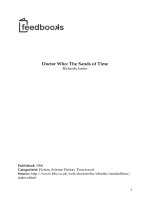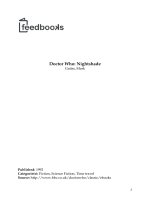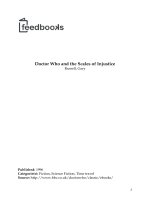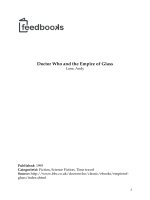Doctor thorne
Bạn đang xem bản rút gọn của tài liệu. Xem và tải ngay bản đầy đủ của tài liệu tại đây (2.11 MB, 594 trang )
TheProjectGutenbergeBook,
DoctorThorne,byAnthonyTrollope
ThiseBookisfortheuseofanyoneanywhereatnocostandwith
almostnorestrictionswhatsoever.Youmaycopyit,giveitawayor
re-useitunderthetermsoftheProjectGutenbergLicenseincluded
withthiseBookoronlineatwww.gutenberg.org
Title:DoctorThorne
Author:AnthonyTrollope
ReleaseDate:April,2002[eBook#3166]
[Datethistitlefirstposted:January30,2001]
[Mostrecentlyupdated:March28,2016]
Language:English
Charactersetencoding:ISO-8859-1
***START OF THE PROJECT GUTENBERG EBOOK DOCTOR
THORNE***
E-textpreparedbyKennethDavidCooper
andrevisedbyJosephE.Loewenstein,M.D.
HTMLversionpreparedbyJosephE.Loewenstein,M.D.
DOCTORTHORNE
by
ANTHONYTROLLOPE
Firstpublishedin1858
CONTENTS
I. TheGreshamsofGreshamsbury
II. Long,LongAgo
III. DrThorne
IV. LessonsfromCourcyCastle
V. FrankGresham'sFirstSpeech
VI. FrankGresham'sEarlyLoves
VII. TheDoctor'sGarden
VIII. MatrimonialProspects
IX. SirRogerScatcherd
X. SirRoger'sWill
XI. TheDoctorDrinksHisTea
XII. WhenGreekMeetsGreek,ThenComestheTugofWar
XIII. TheTwoUncles
XIV. SentenceofExile
XV. Courcy
XVI. MissDunstable
XVII. TheElection
XVIII. TheRivals
XIX. TheDukeofOmnium
XX. TheProposal
XXI. MrMoffatFallsintoTrouble
XXII. SirRogerIsUnseated
XXIII. Retrospective
XXIV. LouisScatcherd
XXV. SirRogerDies
XXVI. War
XXVII. MissThorneGoesonaVisit
XXVIII. TheDoctorHearsSomethingtoHisAdvantage
XXIX. TheDonkeyRide
XXX. PostPrandial
XXXI. TheSmallEndoftheWedge
XXXII. MrOriel
XXXIII. AMorningVisit
XXXIV. ABaroucheandFourArrivesatGreshamsbury
XXXV. SirLouisGoesOuttoDinner
XXXVI. WillHeComeAgain?
XXXVII. SirLouisLeavesGreshamsbury
XXXVIII. DeCourcyPreceptsanddeCourcyPractice
XXXIX. WhattheWorldSaysaboutBlood
XL. TheTwoDoctorsChangePatients
XLI. DoctorThorneWon'tInterfere
XLII. WhatCanYouGiveinReturn?
XLIII. TheRaceofScatcherdBecomesExtinct
XLIV. SaturdayEveningandSundayMorning
XLV. LawBusinessinLondon
XLVI. OurPetFoxFindsaTail
HowtheBrideWasReceived,
XLVII.
andWhoWereAskedtotheWedding
CHAPTERI
TheGreshamsofGreshamsbury
Before the reader is introduced to the modest country medical practitioner
who is to be the chief personage of the following tale, it will be well that he
shouldbemadeacquaintedwithsomeparticularsastothelocalityinwhich,and
theneighboursamongwhom,ourdoctorfollowedhisprofession.
There is a county in the west of England not so full of life, indeed, nor so
widelyspokenofassomeofitsmanufacturingleviathanbrethren inthenorth,
but which is, nevertheless, very dear to those who know it well. Its green
pastures,itswavingwheat,itsdeepandshadyand—letusadd—dirtylanes,its
paths and stiles, its tawny-coloured, well-built rural churches, its avenues of
beeches,andfrequentTudormansions,itsconstantcountyhunt,itssocialgraces,
and the general air of clanship which pervades it, has made it to its own
inhabitantsafavouredlandofGoshen.Itispurelyagricultural;agriculturalinits
produce, agricultural in its poor, and agricultural in its pleasures. There are
towns in it, of course; dépôts from whence are brought seeds and groceries,
ribbonsandfire-shovels;inwhichmarketsareheldandcountyballsarecarried
on; which return members to Parliament, generally—in spite of Reform Bills,
past, present, and coming—in accordance with the dictates of some
neighbouring land magnate: from whence emanate the country postmen, and
where is located the supply of post-horses necessary for county visitings. But
thesetownsaddnothingtotheimportanceofthecounty;theyconsist,withthe
exception of the assize town, of dull, all but death-like single streets. Each
possessestwopumps,threehotels,tenshops,fifteenbeer-houses,abeadle,anda
market-place.
Indeed, the town population of the county reckons for nothing when the
importanceofthecountyisdiscussed,withtheexception,asbeforesaid,ofthe
assizetown,whichisalsoacathedralcity.Hereinisaclericalaristocracy,which
is certainly not without its due weight. A resident bishop, a resident dean, an
archdeacon, three or four resident prebendaries, and all their numerous
chaplains,vicars,andecclesiasticalsatellites,domakeupasocietysufficiently
powerfultobecountedassomethingbythecountysquirearchy.Inotherrespects
thegreatnessofBarsetshiredependswhollyonthelandedpowers.
Barsetshire,however,isnotnowsoessentiallyonewholeasitwasbeforethe
ReformBilldividedit.ThereisinthesedaysanEastBarsetshire,andthereisa
West Barsetshire; and people conversant with Barsetshire doings declare that
theycanalreadydeciphersomedifferenceoffeeling,somedivisionofinterests.
TheeasternmoietyofthecountyismorepurelyConservativethanthewestern;
thereis,or was,a taintofPeelisminthelatter;andthen,too,theresidenceof
twosuchgreatWhigmagnatesastheDukeofOmniumandtheEarldeCourcy
in that locality in some degree overshadows and renders less influential the
gentlemenwholivenearthem.
ItistoEastBarsetshirethatwearecalled.Whenthedivisionabovespokenof
was first contemplated, in those stormy days in which gallant men were still
combatting reform ministers, if not with hope, still with spirit, the battle was
foughtbynonemorebravelythanbyJohnNewboldGreshamofGreshamsbury,
the member for Barsetshire. Fate, however, and the Duke of Wellington were
adverse, and in the following Parliament John Newbold Gresham was only
memberforEastBarsetshire.
Whetherornot itwastrue,asstatedatthetime,thattheaspectofthemen
withwhomhewascalledontoassociateatStStephen'sbrokehisheart,itisnot
forusnowtoinquire.Itiscertainlytruethathedidnotlivetoseethefirstyear
ofthereformedParliamentbroughttoaclose.ThethenMrGreshamwasnotan
oldmanatthetimeofhisdeath,andhiseldestson,FrancisNewboldGresham,
was a very young man; but, notwithstanding his youth, and notwithstanding
other grounds of objection which stood in the way of such preferment, and
which must be explained, he was chosen in his father's place. The father's
serviceshadbeentoorecent,toowellappreciated,toothoroughlyinunisonwith
thefeelingsofthosearoundhim toallowofanyotherchoice;andinthisway
youngFrankGreshamfoundhimselfmemberforEastBarsetshire,althoughthe
very men who elected him knew that they had but slender ground for trusting
himwiththeirsuffrages.
Frank Gresham, though then only twenty-four years of age, was a married
man, and a father. He had already chosen a wife, and by his choice had given
muchgroundofdistrusttothemenofEastBarsetshire.Hehadmarriednoother
than Lady Arabella de Courcy, the sister of the great Whig earl who lived at
CourcyCastleinthewest;thatearlwhonotonlyvotedfortheReformBill,but
hadbeeninfamouslyactiveinbringingoverotheryoungpeers sotovote, and
whose name therefore stank in the nostrils of the staunch Tory squires of the
county.
Not only had Frank Gresham so wedded, but having thus improperly and
unpatrioticallychosenawife,hehadaddedtohissinsbybecomingrecklessly
intimate with his wife's relations. It is true that he still called himself a Tory,
belonged to the club of which his father had been one of the most honoured
members,andinthedaysofthegreatbattlegothisheadbrokeninarow,onthe
rightside;but,nevertheless,itwasfeltbythegoodmen,trueandblue,ofEast
Barsetshire,thataconstantsojourneratCourcyCastlecouldnotberegardedasa
consistentTory.When,however,hisfatherdied,thatbrokenheadservedhimin
goodstead:hissufferingsinthecauseweremadethemostof;these,inunison
with his father's merits, turned the scale, and it was accordingly decided, at a
meeting held at the George and Dragon, at Barchester, that Frank Gresham
shouldfillhisfather'sshoes.
But Frank Gresham could not fill his father's shoes; they were too big for
him.HedidbecomememberforEastBarsetshire,buthewassuchamember—
solukewarm,soindifferent,sopronetoassociatewiththeenemiesofthegood
cause,solittlewillingtofightthegoodfight,thathesoondisgustedthosewho
mostdearlylovedthememoryoftheoldsquire.
DeCourcyCastleinthosedayshadgreatallurementsforayoungman,and
all those allurements were made the most of to win over young Gresham. His
wife,whowasayearortwoolderthanhimself,wasafashionablewoman,with
thorough Whig tastes and aspirations, such as became the daughter of a great
Whigearl;shecaredforpolitics,orthoughtthatshecaredforthem,morethan
herhusbanddid;foramonthortwoprevioustoherengagementshehadbeen
attachedtotheCourt,andhadbeenmadetobelievethatmuchofthepolicyof
England's rulers depended on the political intrigues of England's women. She
wasonewhowouldfainbedoingsomethingifsheonlyknewhow,andthefirst
importantattemptshemadewastoturnherrespectableyoungToryhusbandinto
asecond-rateWhigbantling.Asthislady'scharacterwill,itishoped,showitself
inthefollowingpages,weneednotnowdescribeitmoreclosely.
Itisnotabadthingtobeson-in-lawtoapotentearl,memberofParliament
foracounty,andapossessorofafineoldEnglishseat,andafineoldEnglish
fortune. As a very young man, Frank Gresham found the life to which he was
thusintroducedagreeableenough.Heconsoledhimselfasbesthemightforthe
bluelookswithwhichhewasgreetedbyhisownparty,andtookhisrevengeby
consorting more thoroughly than ever with his political adversaries. Foolishly,
likeafoolishmoth,heflewtothebrightlight,and,likethemoths,ofcoursehe
burnthiswings.Earlyin1833hehadbecomeamemberofParliament,andin
theautumnof1834thedissolutioncame.Youngmembersofthreeorfour-andtwentydonotthinkmuchofdissolutions,forgetthefanciesoftheirconstituents,
andaretooproudofthepresenttocalculatemuchastothefuture.Soitwaswith
Mr Gresham. His father had been member for Barsetshire all his life, and he
lookedforwardtosimilarprosperityasthoughitwerepartofhisinheritance;but
hefailedtotakeanyofthestepswhichhadsecuredhisfather'sseat.
In the autumn of 1834 the dissolution came, and Frank Gresham, with his
honourable lady wife and all the de Courcys at his back, found that he had
mortallyoffendedthecounty.Tohisgreatdisgustanothercandidatewasbrought
forward as a fellow to his late colleague, and though he manfully fought the
battle, and spent ten thousand pounds in the contest, he could not recover his
position.AhighTory,withagreatWhiginteresttobackhim,isneverapopular
person in England. No one can trust him, though there may be those who are
willing to place him, untrusted, in high positions. Such was the case with Mr
Gresham.Thereweremanywhowerewilling,forfamilyconsiderations,tokeep
him in Parliament; but no one thought that he was fit to be there. The
consequenceswere,thatabitterandexpensivecontestensued.FrankGresham,
when twitted with being a Whig, foreswore the de Courcy family; and then,
whenridiculedashavingbeenthrownoverbytheTories,foresworehisfather's
oldfriends.Sobetweenthetwostoolshefelltotheground,and,asapolitician,
heneveragainrosetohisfeet.
Heneveragainrosetohisfeet;buttwiceagainhemadeviolenteffortstodo
so. Elections in East Barsetshire, from various causes, came quick upon each
other in those days, and before he was eight-and-twenty years of age Mr
Greshamhadthreetimescontestedthecountyandbeenthreetimesbeaten.To
speakthetruthofhim,hisownspiritwouldhavebeensatisfiedwiththelossof
thefirsttenthousandpounds;butLadyArabellawasmadeofhighermettle.She
hadmarriedamanwithafineplaceandafinefortune;butshehadnevertheless
married a commoner and had in so far derogated from her high birth. She felt
thatherhusbandshouldbebyrightsamemberoftheHouseofLords;but,ifnot,
thatitwasatleastessentialthatheshouldhaveaseatinthelowerchamber.She
wouldbydegreessinkintonothingifsheallowedherselftositdown,themere
wifeofamerecountrysquire.
Thus instigated, Mr Gresham repeated the useless contest three times, and
repeatediteachtimeataseriouscost.Helosthismoney,LadyArabellalosther
temper, and things at Greshamsbury went on by no means as prosperously as
theyhaddoneinthedaysoftheoldsquire.
Inthefirsttwelveyearsoftheirmarriage,childrencamefastintothenursery
atGreshamsbury.Thefirstthatwasbornwasaboy;andinthosehappyhalcyon
days,whentheoldsquirewasstillalive,greatwasthejoyatthebirthofanheir
toGreshamsbury;bonfiresgleamedthroughthecountry-side,oxenwereroasted
whole, and the customary paraphernalia of joy, usual to rich Britons on such
occasionsweregonethroughwithwondrouséclat.Butwhenthetenthbaby,and
theninthlittlegirl,wasbroughtintotheworld,theoutwardshowofjoywasnot
sogreat.
Thenothertroublescameon.Someoftheselittlegirlsweresickly,somevery
sickly. Lady Arabella had her faults, and they were such as were extremely
detrimental to her husband's happiness and her own; but that of being an
indifferentmotherwasnotamongthem.Shehadworriedherhusbanddailyfor
yearsbecausehewasnotinParliament,shehadworriedhimbecausehewould
not furnish the house in Portman Square, she had worried him because he
objectedtohavemorepeopleeverywinteratGreshamsburyParkthanthehouse
would hold; but now she changed her tune and worried him because Selina
coughed,becauseHelenawashectic,becausepoorSophy'sspinewasweak,and
Matilda'sappetitewasgone.
Worryingfromsuchcauseswaspardonableitwillbesaid.Soitwas;butthe
manner was hardly pardonable. Selina's cough was certainly not fairly
attributabletotheold-fashionedfurnitureinPortmanSquare;norwouldSophy's
spinehavebeenmateriallybenefitedbyherfatherhavingaseatinParliament;
and yet, to have heard Lady Arabella discussing those matters in family
conclave,onewouldhavethoughtthatshewouldhaveexpectedsuchresults.
As it was, her poor weak darlings were carried about from London to
Brighton,fromBrightontosomeGermanbaths,fromtheGermanbathsbackto
Torquay,andthence—asregardedthefourwehavenamed—tothatbournefrom
whencenofurtherjourneycouldbemadeundertheLadyArabella'sdirections.
The one son and heir to Greshamsbury was named as his father, Francis
NewboldGresham.Hewouldhavebeentheheroofourtalehadnotthatplace
beenpre-occupiedbythevillagedoctor.Asitis,thosewhopleasemaysoregard
him.Itishewhoistobeourfavouriteyoungman,todothelovescenes,tohave
histrialsandhisdifficulties,andtowinthroughthemornot,asthecasemaybe.
Iamtoooldnowtobeahard-heartedauthor,andsoitisprobablethathemay
not die of a broken heart. Those who don't approve of a middle-aged bachelor
country doctor as a hero, may take the heir to Greshamsbury in his stead, and
call the book, if it so please them, "The Loves and Adventures of Francis
NewboldGreshamtheYounger."
AndMasterFrankGreshamwasnotilladaptedforplayingthepartofahero
ofthissort.Hedidnotsharehissisters'ill-health,andthoughtheonlyboyofthe
family, he excelled all his sisters in personal appearance. The Greshams from
timeimmemorialhadbeenhandsome.Theywerebroadbrowed,blueeyed,fair
haired,bornwithdimplesintheirchins,andthatpleasant,aristocraticdangerous
curl of the upper lip which can equally express good humour or scorn. Young
FrankwaseveryinchaGresham,andwasthedarlingofhisfather'sheart.
ThedeCourcyshadneverbeenplain.Therewastoomuchhauteur,toomuch
pride, we may perhaps even fairly say, too much nobility in their gait and
manners, and even in their faces, to allow of their being considered plain; but
theywerenotaracenurturedbyVenusorApollo.Theyweretallandthin,with
highcheek-bones,highforeheads,andlarge,dignified,coldeyes.ThedeCourcy
girlshadallgoodhair;and,astheyalsopossessedeasymannersandpowersof
talking,theymanagedtopassintheworldforbeautiestilltheywereabsorbedin
the matrimonial market, and the world at large cared no longer whether they
werebeautiesornot.TheMissesGreshamweremadeinthedeCourcymould,
andwerenotonthisaccountthelessdeartotheirmother.
The two eldest, Augusta and Beatrice, lived, and were apparently likely to
live.Thefournextfadedanddiedoneafteranother—allinthesamesadyear—
andwerelaidintheneat,newcemeteryatTorquay.Thencameapair,bornat
one birth, weak, delicate, frail little flowers, with dark hair and dark eyes, and
thin, long, pale faces, with long, bony hands, and long bony feet, whom men
looked on as fated to follow their sisters with quick steps. Hitherto, however,
theyhadnotfollowedthem,norhadtheysufferedastheirsistershadsuffered;
and some people at Greshamsbury attributed this to the fact that a change had
beenmadeinthefamilymedicalpractitioner.
Thencametheyoungestoftheflock,shewhosebirthwehavesaidwasnot
heraldedwithloudjoy;forwhenshecameintotheworld,fourothers,withpale
temples,wan,worncheeks,andskeleton,whitearms,wereawaitingpermission
toleaveit.
Suchwasthefamilywhen,intheyear1854,theeldestsoncameofage.He
hadbeeneducatedatHarrow,andwasnowstillatCambridge;but,ofcourse,on
suchadayasthishewasathome.Thatcomingofagemustbeadelightfultime
toayoungmanborntoinheritbroadacresandwidewealth.Thosefull-mouthed
congratulations; those warm prayers with which his manhood is welcomed by
thegrey-hairedseniorsofthecounty;theaffectionate,allbutmotherlycaresses
ofneighbouringmotherswhohaveseenhimgrowupfromhiscradle,ofmothers
whohavedaughters,perhaps,fairenough,andgoodenough,andsweetenough
evenforhim;thesoft-spoken,half-bashful,buttendergreetingsofthegirls,who
now,perhapsforthefirsttime,callhimbyhissternfamilyname,instructedby
instinctratherthanpreceptthatthetimehascomewhenthefamiliarCharlesor
familiarJohnmustbythembelaidaside;the"luckydogs,"andhintsofsilver
spoonswhicharepouredintohisearsaseachyoungcompeerslapshisbackand
bidshimliveathousandyearsandthenneverdie;theshoutingofthetenantry,
thegoodwishesoftheoldfarmerswhocomeuptowringhishand,thekisses
which he gets from the farmers' wives, and the kisses which he gives to the
farmers'daughters;allthesethingsmustmakethetwenty-firstbirthdaypleasant
enoughtoayoungheir.Toayouth,however,whofeelsthatheisnowliableto
arrest,andthatheinheritsnootherprivilege,thepleasuremayverypossiblynot
bequitesokeen.
The case with young Frank Gresham may be supposed to much nearer the
former than the latter; but yet the ceremony of his coming of age was by no
meanslikethatwhichfatehadaccordedtohisfather.MrGreshamwasnowan
embarrassedman,andthoughtheworlddidnotknowit,or,atanyrate,didnot
know that he was deeply embarrassed, he had not the heart to throw open his
mansionandreceivethecountywithafreehandasthoughallthingsweregoing
wellwithhim.
Nothingwasgoingwellwithhim.LadyArabellawouldallownothingnear
himoraroundhimtobewell.Everythingwithhimnowturnedtovexation;he
wasnolongerajoyous,happyman,andthepeopleofEastBarsetshiredidnot
lookforgaladoingsonagrandscalewhenyoungGreshamcameofage.
Gala doings, to a certain extent, there were there. It was in July, and tables
were spread under the oaks for the tenants. Tables were spread, and meat, and
beer,andwinewerethere,andFrank,ashewalkedroundandshookhisguests
bythehand,expressedahopethattheirrelationswitheachothermightbelong,
close,andmutuallyadvantageous.
Wemustsayafewwordsnowabouttheplaceitself.GreshamsburyParkwas
afineoldEnglishgentleman'sseat—wasandis;butwecanassertitmoreeasily
in past tense, as we are speaking of it with reference to a past time. We have
spokenofGreshamsburyPark;therewasaparksocalled,butthemansionitself
wasgenerallyknownasGreshamsburyHouse,anddidnotstandinthepark.We
may perhaps best describe it by saying that the village of Greshamsbury
consisted of one long, straggling street, a mile in length, which in the centre
turnedsharpround,sothatonehalfofthestreetlaydirectlyatrightanglestothe
other. In this angle stood Greshamsbury House, and the gardens and grounds
arounditfilledupthespacesomade.Therewasanentrancewithlargegatesat
eachendofthevillage,andeachgatewasguardedbytheeffigiesoftwohuge
paganswithclubs,suchbeingthecrestbornebythefamily;fromeachentrance
abroadroad,quitestraight,runningthroughtoamajesticavenueoflimes,led
uptothehouse.Thiswasbuiltintherichest,perhapsweshouldrathersayinthe
purest,styleofTudorarchitecture;somuchsothat,thoughGreshamsburyisless
completethanLongleat,lessmagnificentthanHatfield,itmayinsomesensebe
said to be the finest specimen of Tudor architecture of which the country can
boast.
It stands amid a multitude of trim gardens and stone-built terraces, divided
onefromanother:thesetooureyesarenotsoattractiveasthatbroadexpanseof
lawnbywhichourcountryhousesaregenerallysurrounded;butthegardensof
Greshamsbury have been celebrated for two centuries, and any Gresham who
wouldhavealteredthemwouldhavebeenconsideredtohavedestroyedoneof
thewell-knownlandmarksofthefamily.
GreshamsburyPark—properlysocalled—spreadfaraway ontheotherside
of the village. Opposite to the two great gates leading up to the mansion were
twosmallergates,theoneopeningontothestables,kennels,andfarm-yard,and
theothertothedeerpark.Thislatterwastheprincipalentrancetothedemesne,
andagrandandpicturesqueentranceitwas.Theavenueoflimeswhichonone
sidestretcheduptothehouse,wasontheotherextendedforaquarterofamile,
andthenappearedtobeterminatedonlybyanabruptriseintheground.Atthe
entrance there were four savages and four clubs, two to each portal, and what
with the massive iron gates, surmounted by a stone wall, on which stood the
family arms supported by two other club-bearers, the stone-built lodges, the
Doric,ivy-coveredcolumnswhichsurroundedthecircle,thefourgrimsavages,
andtheextentofthespaceitselfthroughwhichthehighroadran,andwhichjust
abutted on the village, the spot was sufficiently significant of old family
greatness.
Those who examined it more closely might see that under the arms was a
scrollbearingtheGreshammotto,andthatthewordswererepeatedinsmaller
letters under each of the savages. "Gardez Gresham," had been chosen in the
days of motto-choosing probably by some herald-at-arms as an appropriate
legend for signifying the peculiar attributes of the family. Now, however,
unfortunately, men were not of one mind as to the exact idea signified. Some
declared, with much heraldic warmth, that it was an address to the savages,
calling onthemtotakecareoftheir patron;whileothers,withwhomImyself
am inclined to agree, averred with equal certainty that it was an advice to the
peopleatlarge,especiallytothoseinclinedtorebelagainstthearistocracyofthe
county, that they should "beware the Gresham." The latter signification would
betoken strength—so said the holders of this doctrine; the former weakness.
Now the Greshams were ever a strong people, and never addicted to a false
humility.
Wewillnotpretendtodecidethequestion.Alas!eitherconstructionwasnow
equally unsuited to the family fortunes. Such changes had taken place in
EnglandsincetheGreshamshadfoundedthemselvesthatnosavagecouldany
longerinanywayprotectthem;theymustprotectthemselveslikecommonfolk,
orliveunprotected.Nornowwasitnecessarythatanyneighbourshouldshake
inhisshoeswhentheGreshamfrowned.Itwouldhavebeentobewishedthat
the present Gresham himself could have been as indifferent to the frowns of
someofhisneighbours.
Buttheoldsymbolsremained,andmaysuchsymbolslongremainamongus;
they are still lovely and fit to be loved. They tell us of the true and manly
feelingsofothertimes;andtohimwhocanreadaright,theyexplainmorefully,
moretrulythananywrittenhistorycando,howEnglishmenhavebecomewhat
they are. England is not yet a commercial country in the sense in which that
epithetisusedforher;andletusstillhopethatshewillnotsoonbecomeso.She
might surely as well be called feudal England, or chivalrous England. If in
westerncivilisedEuropetheredoesexistanationamongwhomtherearehigh
signors, and with whom the owners of the land are the true aristocracy, the
aristocracy that is trusted as being best and fittest to rule, that nation is the
English.ChooseoutthetenleadingmenofeachgreatEuropeanpeople.Choose
theminFrance,inAustria,Sardinia,Prussia,Russia,Sweden,Denmark,Spain
(?),andthenselecttheteninEnglandwhosenamesarebestknownasthoseof
leading statesmen; the result will show in which country there still exists the
closest attachment to, the sincerest trust in, the old feudal and now so-called
landedinterests.
England a commercial country! Yes; as Venice was. She may excel other
nationsincommerce,butyetitisnotthatinwhichshemostpridesherself,in
which she most excels. Merchants as such are not the first men among us;
thoughitperhapsbeopen,barelyopen,toamerchanttobecomeoneofthem.
Buying and selling is good and necessary; it is very necessary, and may,
possibly,beverygood;butitcannotbethenoblestworkofman;andletushope
thatitmaynotinourtimebeesteemedthenoblestworkofanEnglishman.
GreshamsburyParkwasverylarge;itlayontheoutsideoftheangleformed
bythevillagestreet,andstretchedawayontwosideswithoutapparentlimitor
boundariesvisiblefromthevillageroadorhouse.Indeed,thegroundonthisside
was so broken up into abrupt hills, and conical-shaped, oak-covered
excrescences,whichwereseenpeepingupthroughandovereachother,thatthe
trueextentoftheparkwasmuchmagnifiedtotheeye.Itwasverypossiblefora
strangertogetintoitandtofindsomedifficultyingettingoutagainbyanyofits
knowngates;andsuchwasthebeautyofthelandscape,thataloverofscenery
wouldbetemptedthustolosehimself.
I have said that on one side lay the kennels, and this will give me an
opportunityofdescribinghereoneespecialepisode,alongepisode,inthelifeof
theexistingsquire.HehadoncerepresentedhiscountyinParliament,andwhen
heceasedtodosohestillfeltanambitiontobeconnectedinsomepeculiarway
with that county's greatness; he still desired that Gresham of Greshamsbury
should be something more in East Barsetshire than Jackson of the Grange, or
Baker of Mill Hill, or Bateson of Annesgrove. They were all his friends, and
very respectable country gentlemen; but Mr Gresham of Greshamsbury should
be more than this: even he had enough of ambition to be aware of such a
longing.Therefore,whenanopportunityoccurredhetooktohuntingthecounty.
Forthisemploymenthewasineverywaywellsuited—unlessitwasinthe
matter of finance. Though he had in his very earliest manly years given such
greatoffencebyindifferencetohisfamilypolitics,andhadinacertaindegree
fosteredtheill-feelingbycontestingthecountyinoppositiontothewishesofhis
brothersquires,nevertheless,heborealovedandpopularname.Menregretted
thatheshouldnothavebeenwhattheywishedhimtobe,thatheshouldnothave
beensuchaswastheoldsquire;butwhentheyfoundthatsuchwasthecase,that
hecouldnotbegreatamongthemasapolitician,theywerestillwillingthathe
shouldbegreatinanyotherwayiftherewerecountygreatnessforwhichhewas
suited.Nowhewasknownasanexcellenthorseman,asathoroughsportsman,
as one knowing in dogs, and tender-hearted as a sucking mother to a litter of
youngfoxes;hehadriddeninthecountysincehewasfifteen,hadafinevoice
for a view-hallo, knew every hound by name, and could wind a horn with
sufficientmusicforallhuntingpurposes;moreover,hehadcometohisproperty,
as was well known through all Barsetshire, with a clear income of fourteen
thousandayear.
Thus,whensomeoldworn-outmasterofhoundswasruntoground,abouta
yearafterMrGresham'slastcontestforthecounty,itseemedtoallpartiestobe
apleasantandrationalarrangementthatthehoundsshouldgotoGreshamsbury.
Pleasant, indeed, to all except the Lady Arabella; and rational, perhaps, to all
exceptthesquirehimself.
All this time he was already considerably encumbered. He had spent much
more than he should have done, and so indeed had his wife, in those two
splendid years in which they had figured as great among the great ones of the
earth.Fourteenthousandayearoughttohavebeenenoughtoallowamemberof
Parliament with a young wife and two or three children to live in London and
keepuptheircountryfamilymansion;butthenthedeCourcyswereverygreat
people,andLadyArabellachosetoliveasshehadbeenaccustomedtodo,and
ashersister-in-lawthecountesslived:nowLorddeCourcyhadmuchmorethan
fourteenthousandayear.Thencamethethreeelections,withtheirvastattendant
cost, and then those costly expedients to which gentlemen are forced to have
recoursewhohavelivedbeyondtheirincome,andfinditimpossiblesotoreduce
their establishments as to live much below it. Thus when the hounds came to
Greshamsbury,MrGreshamwasalreadyapoorman.
LadyArabellasaidmuchtoopposetheircoming;butLadyArabella,though
itcouldhardlybesaidofherthatshewasunderherhusband'srule,certainlywas
notentitledtoboastthatshehadhimunderhers.Shethenmadeherfirstgrand
attack as to the furniture in Portman Square; and was then for the first time
speciallyinformedthatthefurnituretherewasnotmatterofmuchimportance,as
shewouldnotinfutureberequiredtomoveherfamilytothatresidenceduring
the London seasons. The sort of conversations which grew from such a
commencementmaybeimagined.HadLadyArabellaworriedherlordless,he
mightperhapshaveconsideredwithmorecoolnessthefollyofencounteringso
prodigiousanincreasetotheexpenseofhisestablishment;hadhenotspentso
muchmoneyinapursuitwhichhiswifedidnotenjoy,shemightperhapshave
beenmoresparinginherrebukesastohisindifferencetoherLondonpleasures.
As it was, the hounds came to Greshamsbury, and Lady Arabella did go to
Londonforsomeperiodineachyear,andthefamilyexpenseswerebynomeans
lessened.
Thekennels,however,werenowagainempty.Twoyearsprevioustothetime
atwhichourstorybegins,thehoundshadbeencarriedofftotheseatofsome
richersportsman.ThiswasmorefeltbyMrGreshamthananyothermisfortune
whichhehadyetincurred.Hehadbeenmasterofhoundsfortenyears,andthat
workhehadatanyratedonewell.Thepopularityamonghisneighbourswhich
he had lost as a politician he had regained as a sportsman, and he would fain
haveremainedautocraticinthehunt,haditbeenpossible.Buthesoremained
muchlongerthanheshouldhavedone,andatlasttheywentaway,notwithout
signsandsoundsofvisiblejoyonthepartofLadyArabella.
ButwehavekepttheGreshamsburytenantrywaitingundertheoak-treesby
fartoolong.Yes;whenyoungFrankcameofagetherewasstillenoughleftat
Greshamsbury,stillmeansenoughatthesquire'sdisposal,tolightonebonfire,to
roast, whole in its skin, one bullock. Frank's virility came on him not quite
unmarked,asthatoftheparson'ssonmightdo,orthesonoftheneighbouring
attorney.ItcouldstillbereportedintheBarsetshireConservativeStandardthat
"The beards wagged all" at Greshamsbury, now as they had done for many
centuries on similar festivals. Yes; it was so reported. But this, like so many
othersuchreports,hadbutashadowoftruthinit."Theypouredtheliquorin,"
certainly, those who were there; but the beards did not wag as they had been
wonttowaginformeryears.Beardswon'twagforthetelling.Thesquirewasat
hiswits'endformoney,andthetenantsoneandallhadsoheard.Rentshadbeen
raisedonthem;timberhadfallenfast;thelawyerontheestatewasgrowingrich;
tradesmeninBarchester,nay,inGreshamsburyitself,werebeginningtomutter;
andthesquirehimselfwouldnotbemerry.Undersuchcircumstancesthethroats
ofatenantrywillstillswallow,buttheirbeardswillnotwag.
"I minds well," said Farmer Oaklerath to his neighbour, "when the squoire
hisself comed of age. Lord love 'ee! There was fun going that day. There was
moreyaledrankthenthan'sbeenbrewedatthebighousethesetwoyears.T'old
squoirewasaone'er."
"And I minds when squoire was borned; minds it well," said an old farmer
sittingopposite."Themwasthedays!Itan'tthatlongagoneither.Squoirea'nt
come o' fifty yet; no, nor an't nigh it, though he looks it. Things be altered at
Greemsbury"—such was the rural pronunciation—"altered sadly, neebor
Oaklerath.Well,well;I'llsoonbegone,Iwill,andsoitan'tnousetalking;but
arter paying one pound fifteen for them acres for more nor fifty year, I didn't
thinkI'deverbeaxedforfortyshilling."
Suchwasthestyleofconversationwhichwentonatthevarioustables.Ithad
certainlybeenofaverydifferenttonewhenthesquirewasborn,whenhecame
ofage,andwhen,justtwoyearssubsequently,hissonhadbeenborn.Oneachof
these events similar rural fêtes had been given, and the squire himself had on
theseoccasionsbeenfrequentamonghisguests.Onthefirst,hehadbeencarried
roundbyhisfather,awholetrainofladiesandnursesfollowing.Onthesecond,
hehadhimselfmixedinallthesports,thegayestofthegay,andeachtenanthad
squeezedhiswayuptothelawntogetasightoftheLadyArabella,who,aswas
already known, was to come from Courcy Castle to Greshamsbury to be their
mistress.ItwaslittletheyanyofthemcarednowfortheLadyArabella.Onthe
third,hehimselfhadbornehischildinhisarmsashisfatherhadbeforeborne
him;hewastheninthezenithofhispride,andthoughthetenantrywhispered
thathewassomewhatlessfamiliarwiththemthanofyore,thathehadputon
somewhattoomuchofthedeCourcyairs,stillhewastheirsquire,theirmaster,
the rich man in whose hand they lay. The old squire was then gone, and they
wereproudoftheyoungmemberandhisladybrideinspiteofalittlehauteur.
Noneofthemwereproudofhimnow.
Hewalkedonceroundamongtheguests,andspokeafewwordsofwelcome
ateachtable;andashedidsothetenantsgotupandbowedandwishedhealthto
theoldsquire,happinesstotheyoungone,andprosperitytoGreshamsbury;but,
nevertheless,itwasbutatameaffair.
There were also other visitors, of the gentle sort, to do honour to the
occasion;butnotsuchswarms,notsuchacrowdatthemansionitselfandatthe
housesoftheneighbouringgentryashadalwaysbeencollectedontheseformer
gala doings. Indeed, the party at Greshamsbury was not a large one, and
consistedchieflyofLadydeCourcyandhersuite.LadyArabellastillkeptup,as
farasshewasable,hercloseconnexionwithCourcyCastle.Shewasthereas
much as possible, to which Mr Gresham never objected; and she took her
daughterstherewhenevershecould,though,asregardedthetwoeldergirls,she
was interfered with by Mr Gresham, and not unfrequently by the girls
themselves.LadyArabellahadaprideinherson,thoughhewasbynomeans
her favourite child. He was, however, the heir of Greshamsbury, of which fact
shewasdisposedtomakethemost,andhewasalsoafinegainlyopen-hearted
young man, who could not but be dear to any mother. Lady Arabella did love
himdearly,thoughshefeltasortofdisappointmentinregardtohim,seeingthat
hewasnotsomuchlikeadeCourcyasheshouldhavebeen.Shedidlovehim
dearly;and,therefore,whenhecameofageshegothersister-in-lawandallthe
LadiesAmelia,Rosinaetc.,tocometoGreshamsbury;andshealso,withsome
difficulty, persuaded the Honourable Georges and the Honourable Johns to be
equallycondescending.LorddeCourcyhimselfwasinattendanceattheCourt
—or said that he was—and Lord Porlock, the eldest son, simply told his aunt
whenhewasinvitedthatheneverboredhimselfwiththosesortofthings.
Then there were the Bakers, and the Batesons, and the Jacksons, who all
livednearandreturnedhomeatnight;therewastheReverendCalebOriel,the
High-Churchrector,withhisbeautifulsister,PatienceOriel;therewasMrYates
Umbleby, the attorney and agent; and there was Dr Thorne, and the doctor's
modest,quiet-lookinglittleniece,MissMary.
CHAPTERII
Long,LongAgo
As Dr Thorne is our hero—or I should rather say my hero, a privilege of
selectingforthemselvesinthisrespectbeinglefttoallmyreaders—andasMiss
MaryThorneistobeourheroine,apointonwhichnochoicewhatsoeverisleft
to any one, it is necessary that they shall be introduced and explained and
described in a proper, formal manner. I quite feel that an apology is due for
beginninganovelwithtwolongdullchaptersfullofdescription.Iamperfectly
awareofthedangerofsuchacourse.InsodoingIsinagainstthegoldenrule
whichrequiresusalltoputourbestfootforemost,thewisdomofwhichisfully
recognised by novelists, myself among the number. It can hardly be expected
that any one will consent to go through with a fiction that offers so little of
allurementinitsfirstpages;buttwistitasIwillIcannotdootherwise.Ifindthat
IcannotmakepoorMrGreshamhemandhawandturnhimselfuneasilyinhis
arm-chairinanaturalmannertillIhavesaidwhyheisuneasy.Icannotbringin
mydoctorspeakinghismindfreelyamongthebigwigstillIhaveexplainedthat
itisinaccordancewithhisusualcharactertodoso.Thisisunartisticonmypart,
and shows want of imagination as well as want of skill. Whether or not I can
atone for these faults by straightforward, simple, plain story-telling—that,
indeed,isverydoubtful.
DrThornebelongedtoafamilyinonesenseasgood,andatanyrateasold,
asthatofMrGresham;andmucholder,hewasapttoboast,thanthatofthede
Courcys.Thistraitinhischaracterismentionedfirst,asitwastheweaknessfor
which he was most conspicuous. He was second cousin to Mr Thorne of
Ullathorne,aBarsetshiresquirelivingintheneighbourhoodofBarchester,and
whoboastedthathisestatehadremainedinhisfamily,descendingfromThorne
to Thorne, longer than had been the case with any other estate or any other
familyinthecounty.
But Dr Thorne was only a second cousin; and, therefore, though he was
entitled to talk of the blood as belonging to some extent to himself, he had no
righttolayclaimtoanypositioninthecountyotherthansuchashemightwin
forhimselfifhechosetolocatehimselfinit.Thiswasafactofwhichnoone
was more fully aware than our doctor himself. His father, who had been first
cousinofaformerSquireThorne,hadbeenaclericaldignitaryinBarchester,but
hadbeendeadnowmanyyears.Hehadhadtwosons;onehehadeducatedasa
medicalman,buttheother,andtheyounger,whomhehadintendedfortheBar,
had not betaken himself in any satisfactory way to any calling. This son had
been first rusticated from Oxford, and then expelled; and thence returning to
Barchester,hadbeenthecausetohisfatherandbrotherofmuchsuffering.
Old Dr Thorne, the clergyman, died when the two brothers were yet young
men,andleftbehindhimnothingbutsomehouseholdandotherpropertyofthe
valueofabouttwothousandpounds,whichhebequeathedtoThomas,theelder
son, much more than that having been spent in liquidating debts contracted by
the younger. Up to that time there had been close harmony between the
Ullathorne family and that of the clergyman; but a month or two before the
doctor'sdeath—theperiodofwhichwearespeakingwasabouttwo-and-twenty
yearsbeforethecommencementofourstory—thethenMrThorneofUllathorne
hadmadeitunderstoodthathewouldnolongerreceiveathishousehiscousin
Henry,whomheregardedasadisgracetothefamily.
Fathersareapttobemorelenienttotheirsonsthanunclestotheirnephews,
orcousinstoeachother.DrThornestillhopedtoreclaimhisblacksheep,and
thoughtthattheheadofhisfamilyshowedanunnecessaryharshnessinputting
anobstacleinhiswayofdoingso.Andifthefatherwaswarminsupportofhis
profligate son, the young medical aspirant was warmer in support of his
profligate brother. Dr Thorne, junior, was no roué himself, but perhaps, as a
youngman,hehadnotsufficientabhorrenceofhisbrother'svices.Atanyrate,
he stuck to him manfully; and when it was signified in the Close that Henry's
company was not considered desirable at Ullathorne, Dr Thomas Thorne sent
word to the squire that under such circumstances his visits there would also
cease.
This was not very prudent, as the young Galen had elected to establish
himself in Barchester, very mainly in expectation of the help which his
Ullathorneconnexionwouldgivehim.This,however,inhisangerhefailedto
consider;hewasneverknown,eitherinearlyorinmiddlelife,toconsiderinhis
anger those points which were probably best worth his consideration. This,
perhaps, was of the less moment as his anger was of an unenduring kind,
evaporatingfrequentlywithmoreceleritythanhecouldgettheangrywordsout
of his mouth. With the Ullathorne people, however, he did establish a quarrel
sufficientlypermanenttobeofvitalinjurytohismedicalprospects.
Andthenthefatherdied,andthetwobrotherswereleftlivingtogetherwith
very little means between them. At this time there were living, in Barchester,
peopleofthenameofScatcherd.Ofthatfamily,asthenexisting,wehaveonly
todowithtwo,abrotherandasister.Theywereinalowrankoflife,theone
beingajourneymanstone-mason,andtheotheranapprenticetoastraw-bonnet
maker;butthey were, nevertheless, in some sort remarkablepeople. The sister
was reputed in Barchester to be a model of female beauty of the strong and
robustercast,andhadalsoabetterreputationasbeingagirlofgoodcharacter
and honest, womanly conduct. Both of her beauty and of her reputation her
brotherwasexceedinglyproud,andhewasthemoresowhenhelearntthatshe
hadbeenaskedinmarriagebyadecentmaster-tradesmaninthecity.
Roger Scatcherd had also a reputation, but not for beauty or propriety of
conduct.Hewasknownforthebeststone-masoninthefourcounties,andasthe
manwhocould,onoccasion,drinkthemostalcoholinagiventimeinthesame
localities.Asaworkman,indeed,hehadhigherreputateeventhanthis:hewas
not only a good and very quick stone-mason, but he had also a capacity for
turningothermenintogoodstone-masons:hehadagiftofknowingwhataman
couldandshoulddo;and,bydegrees,hetaughthimselfwhatfive,andten,and
twenty—latterly, what a thousand and two thousand men might accomplish
among them: this, also, he did with very little aid from pen and paper, with
which he was not, and never became, very conversant. He had also other gifts
and other propensities. He could talk in a manner dangerous to himself and
others;hecouldpersuadewithoutknowingthathedidso;andbeinghimselfan
extreme demagogue, in those noisy times just prior to the Reform Bill, he
created a hubbub in Barchester of which he himself had had no previous
conception.
Henry Thorne among his other bad qualities had one which his friends
regardedasworsethanalltheothers,andwhichperhapsjustifiedtheUllathorne
peopleintheirseverity.Helovedtoconsortwithlowpeople.Henotonlydrank
—that might have been forgiven—but he drank in tap-rooms with vulgar
drinkers; so said his friends, and so said his enemies. He denied the charge as
beingmadeinthepluralnumber,anddeclaredthathisonlylowco-revellerwas
RogerScatcherd.WithRogerScatcherd,atanyrate,heassociated,andbecame
asdemocraticasRogerwashimself.NowtheThornesofUllathornewereofthe
veryhighestorderofToryexcellence.
WhetherornotMaryScatcherdatonceacceptedtheofferoftherespectable
tradesman,Icannotsay.Aftertheoccurrenceofcertaineventswhichmusthere
shortlybetold,shedeclaredthatsheneverhaddoneso.Herbrotheraverredthat
shemostpositivelyhad.Therespectabletradesmanhimselfrefusedtospeakon
thesubject.
It is certain, however, that Scatcherd, who had hitherto been silent enough
abouthissisterinthosesocialhourswhichhepassedwithhisgentlemanfriend,
boastedoftheengagementwhenitwas,ashesaid,made;andthenboastedalso
ofthegirl'sbeauty.Scatcherd,inspiteofhisoccasionalintemperance,lookedup
intheworld,andthecomingmarriageofhissisterwas,hethought,suitableto
hisownambitionforhisfamily.
Henry Thorne had already heard of, and already seen, Mary Scatcherd; but
hithertoshehadnotfalleninthewayofhiswickedness.Now,however,whenhe
heardthatshewastobedecentlymarried,thedeviltemptedhimtotempther.It
bootsnottotellallthetale.Itcameoutclearlyenoughwhenallwastold,thathe
madehermostdistinctpromisesofmarriage;heevengavehersuchinwriting;
andhavinginthiswayobtainedfromherhercompanyduringsomeofherlittle
holidays—herSundaysorsummerevenings—heseducedher.Scatcherdaccused
himopenlyofhavingintoxicatedherwithdrugs;andThomasThorne,whotook
upthecase,ultimatelybelievedthecharge.ItbecameknowninBarchesterthat
shewaswithchild,andthattheseducerwasHenryThorne.
RogerScatcherd,whenthenewsfirstreachedhim,filledhimselfwithdrink,
andthensworethathewouldkillthemboth.Withmanlywrath,however,heset
forth,firstagainsttheman,andthatwithmanlyweapons.Hetooknothingwith
himbuthisfistsandabigstickashewentinsearchofHenryThorne.
Thetwobrotherswerethenlodgingtogetheratafarm-housecloseabutting
onthe town.This was not aneligibleabodefora medicalpractitioner; but the
youngdoctorhadnotbeenabletosettlehimselfeligiblysincehisfather'sdeath;
and wishing to put what constraint he could upon his brother, had so located
himself.Tothisfarm-housecameRogerScatcherdonesultrysummerevening,
hisangergleamingfromhisbloodshoteyes,andhisrageheightenedtomadness
by the rapid pace at which he had run from the city, and by the ardent spirits
whichwerefermentingwithinhim.
At the very gate of the farm-yard, standing placidly with his cigar in his
mouth, he encountered Henry Thorne. He had thought of searching for him
through the whole premises, of demanding his victim with loud exclamations,
andmakinghiswaytohimthroughallobstacles.Inlieuofthat,therestoodthe
manbeforehim.
"Well,Roger,what'sinthewind?"saidHenryThorne.
Theywerethelastwordsheeverspoke.Hewasansweredbyablowfromthe
blackthorn. A contest ensued, which ended in Scatcherd keeping his word—at
anyrate,asregardedtheworstoffender.Howthefatalblowonthetemplewas
struckwasneverexactlydetermined:onemedicalmansaiditmighthavebeen
doneinafightwithaheavy-headedstick;anotherthoughtthatastonehadbeen
used; a third suggested a stone-mason's hammer. It seemed, however, to be
proved subsequently that no hammer was taken out, and Scatcherd himself
persisted in declaring that he had taken in his hand no weapon but the stick.
Scatcherd, however, was drunk; and even though he intended to tell the truth,
mayhavebeenmistaken.Therewere,however,thefactsthatThornewasdead;
thatScatcherdhadsworntokillhimaboutanhourpreviously;andthathehad
withoutdelayaccomplishedhisthreat.Hewasarrestedandtriedformurder;all
the distressing circumstances of the case came out on the trial: he was found
guilty of manslaughter, and sentenced to be imprisoned for six months. Our
readerswillprobablythinkthatthepunishmentwastoosevere.
ThomasThorneandthefarmerwereonthespotsoonafterHenryThornehad
fallen. The brother was at first furious for vengeance against his brother's
murderer;but,asthefactscameout,ashelearntwhathadbeentheprovocation
given,whathadbeenthefeelingsofScatcherdwhenheleftthecity,determined
to punish him who had ruined his sister, his heart was changed. Those were
tryingdaysforhim.Itbehovedhimtodowhatinhimlaytocoverhisbrother's
memoryfromtheobloquywhichitdeserved;itbehovedhimalsotosave,orto
assist to save, from undue punishment the unfortunate man who had shed his
brother'sblood;anditbehovedhimalso,atleastsohethought,tolookafterthat
poor fallen one whose misfortunes were less merited than those either of his
brotherorofhers.
Andhewasnotthemantogetthroughthesethingslightly,orwithasmuch
ease as he perhaps might conscientiously have done. He would pay for the
defenceoftheprisoner;hewouldpayforthedefenceofhisbrother'smemory;
andhewouldpayforthepoorgirl'scomforts.Hewoulddothis,andhewould
allow no one to help him. He stood alone in the world, and insisted on so
standing. Old Mr Thorne of Ullathorne offered again to open his arms to him;
but he had conceived a foolish idea that his cousin's severity had driven his
brotherontohisbadcareer,andhewouldconsequentlyacceptnokindnessfrom
Ullathorne.MissThorne,theoldsquire'sdaughter—acousinconsiderablyolder
thanhimself,towhomhehadatonetimebeenmuchattached—senthimmoney;
and he returned it to her under a blank cover. He had still enough for those
unhappypurposeswhichhehadinhand.Astowhatmighthappenafterwards,
hewasthenmainlyindifferent.
Theaffairmademuchnoiseinthecounty,andwasinquiredintocloselyby
many of the county magistrates; by none more closely than by John Newbold
Gresham, who was then alive. Mr Gresham was greatly taken with the energy
andjusticeshownbyDrThorneontheoccasion;andwhenthetrialwasover,he
invitedhimtoGreshamsbury.Thevisitendedinthedoctorestablishinghimself









